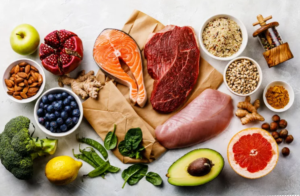 How we live has a major influence on our mental health. Paying attention to the basic lifestyle factors of nutrition, and physical activity lays the foundations for better mental health.
How we live has a major influence on our mental health. Paying attention to the basic lifestyle factors of nutrition, and physical activity lays the foundations for better mental health.
Research on nutrition and mental health has shown that maintaining a healthy diet can help to reduce physiological stress and improve your body’s ability to maintain good mental health, whereas poor nutrition has been associated with mental health conditions including depression and anxiety.
-
The Brain-Gut connection
It is now known through extensive research that the brain has a direct effect on the stomach and intestines and this connection goes both ways. A troubled gut can send signals to the brain, just as a troubled brain can send signals to the gut. Therefore, a person’s stomach or intestinal distress can be the cause or the product of anxiety, stress, or depression. That’s because the brain and the gastrointestinal (GI) system are intimately connected.
In other words, the health of your gut can have a direct impact on both your physical and mental health and maintaining a healthy gut may help to improve symptoms of mental disorders as well as other physical illnesses.
-
What is good gut health?
In your GI tract there is a diverse population of “good” and “bad” bacteria (microbes) known as your microbiome. Good gut health is where your microbiome is balanced in favor of the beneficial or “good” bacteria that help prevent overgrowth of “bad” bacteria that can harm your health.
- To maintain good gut health and control the balance of good and bad bacteria in your GI tract we need to maintain a healthy diet of foods and beverages that can improve and promote this balance.
-
What is a healthy diet?
Your brain needs a lot of nutrients to function and keep you well. We know that fruits and vegetables, grains, fish, lean red meats and olive oils are rich in important nutrients such as folate, magnesium, vitamins and zinc which all impact on body and brain functions, including mood regulation.
You may have noticed that your mood often affects the types of food you choose, as well as how much you eat. Some foods can lift your mood, energy levels, and concentration, while others can have the opposite effect.
Processed foods which are often saturated with sugar, food additives and chemicals, will restrict your intake of nutrients that are essential for good brain functioning. Therefore over-consumption of such foods may increase your risk for some mental health conditions such as anxiety and depression.
Current Australian nutritional guidelines advocate eating a healthy and balanced diet, full of fruit and vegetables, meats, grains, fats, legumes, and dairy. The following resources on nutrition provide further guidance:
- Nutrition Australia – Australian dietary guidelines
- Healthy eating for children
- Healthy eating for adults
-
Probiotics and Prebiotics for Gut Health
To maintain or restore the health of your gut microbiome and support good overall health, ensure that your diet includes foods with probiotic or prebiotic ingredients that are known to help restore balance to the gut microbiome.
Probiotic foods and beverages – contain live beneficial bacteria and include:
- plain yogurt
- kefir
- cottage cheese
- fresh sauerkraut and kimchi
- kombucha
- apple cider vinegar
- miso
Prebiotic Foods – do not contain living organisms but contribute to the health of the microbiome because they contain indigestible fibers that ferment in the GI tract, where they are consumed by probiotic bacteria and converted into other healthful substances.
Prebiotic foods include:
- artichokes
- leeks and onions
- garlic
- chicory
- cabbage
- asparagus
- legumes
- oats
-
Takeaway Food
Whilst it would be easy to say avoid eating takeaway food, the reality is that when you’re feeling stressed or working irregular hours, it can often be an easy option. If you do choose takeaway foods, you can still control how often this happens and what food you put in your body. There are usually healthier fast food options on a menu.
The below resource provides information on some of the best and worst common takeaways.
-
Tips to Support Shift Workers
Working irregular hours can upset your natural body clock, which can affect your appetite, eating habits and lead to physical issues such as weight loss or gain and digestive problems. Below are some things you can do to keep your health on track:
- Don’t stress too much about what time you eat. Instead, focus on how you will get all the nutrition you need into your body. For example, one breakfast style meal, one light meal, one main meal, and one or two snacks.
- Make the meal you have before starting work your main meal and make sure it is packed with as much nutrition as possible.
- Have a small meal and healthy snacks during your shift. Eating large meals during the night can upset your digestion, slow you down and make you tired.
- Avoid high sugar foods and drinks. They may provide a quick boost of energy but this doesn’t last long and can lead to an energy crash.
- Drink plenty of water and watch your caffeine. Caffeine consumption tends to be highest near the end of a shift as energy levels decline. However, caffeine can stay in your system for up to 8 hours, which can affect your sleep. Try to switching to decaffeinated drinks at least four hours before your bedtime.
- Avoid drinking alcohol after work if you intend to go straight to bed. While alcohol can make you feel more relaxed, research also shows that is can disturb your sleep.
- Have a light snack before bedtime. It’s hard to fall asleep when you’re too hungry or too full.
- Have a bottle of probiotic available.
References:
Beyond Blue: https://beyou.edu.au/fact-sheets/wellbeing/nutrition-and-mental-health
Bluespace: https://www.bluespacewellbeing.com.au/support-you/nutrition
Orygen Research Bulletins: https://www.orygen.org.au/Training/Resources/Physical-and-sexual-health/Research-bulletins/Food-for-thought-diet-depression-anxiety
The Brain-Gut Connection | Johns Hopkins Medicine
The gut-brain connection – Harvard Health – https://www.health.harvard.edu › diseases-and-conditions
The Gut Brain Connection: – https://www.psycom.net/the-gut-brain-connection
